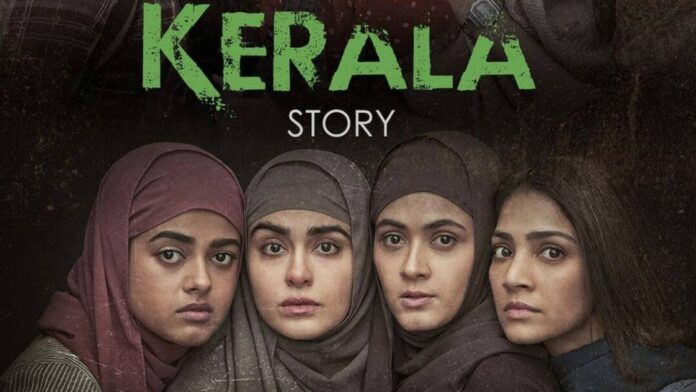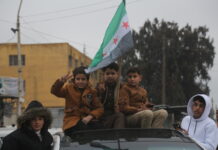
Roshan Muhammed Salih says The Kerala Story is blatant anti-Islam, anti-Muslim hate speech which is being provocatively shown by major cinema chains across the UK in areas where there is a high Muslim population.
Last night I went to see The Kerala Story so that you don’t have to. Let me be clear from the offset, I do not encourage Muslims to watch this film but at the same time I think it’s important that we know what’s in it so that we can argue against it from an informed perspective. And that’s why I went to watch it.
What I witnessed was not just an anti-ISIS film, as many Hindutva claim. What I witnessed was an anti-Islam, anti-Muslim rant with ISIS being used as a pretext to disseminate Islamophobic hate speech.
The Kerala Story is a dull, badly acted, two-hour plus slog through many of the Hindutva’s false and conspiratorial talking points – “love jihad,” forced conversion, Muslims preying on Hindus, Muslim suppression of women, Muslim brutality, Muslim attempts to dominate the world etc.
It is clearly designed to provoke hatred of Islam and Muslims and the fact that it’s being shown in areas of the UK with high Muslim populations (London, Luton, Birmingham, Leicester, Manchester etc) is a total provocation.
Would an anti-Hindu or anti-Jewish hate film be shown in Hindu or Jewish areas of this nation? No they wouldn’t and nor should they be. But it seems Muslims are fair game.
What’s more, the muted Muslim response to this provocation (aside from Shakeel Afsar’s commendable direct action in Cineworld Birmingham) just shows how Muslims have accepted their second class status within this country.
Subscribe to our newsletter and stay updated on the latest news and updates from around the Muslim world!
Lies, lies and more lies
The premise of The Kerala Story is that tens of thousands of women from Kerala, India, have joined ISIS, when the reality is that the number is probably in the single figures.
“This film is based on true events,” the disclaimer at the beginning of the movie says! Clearly the truth didn’t stop the Hindu producers and the Hindu actors from spinning the yarn they wanted to spin.
All of the main Muslim characters in the film – from the groomers and imams in Kerala to the ISIS fighters in Afghanistan – are portrayed as being duplicitous, evil, conniving and brutal.
Surely if the film really was just about ISIS they could have had a few good Muslim characters to balance the bad ones? But nuance and shades of grey are obviously not part of the Hindutva mindset.
The film begins with Shalini (a Hindu girl forcibly converted to Islam) telling her harrowing story to UN peacekeepers in Afghanistan. She informs them through a series of flashbacks that she was groomed through “love jihad” in India, coerced into accepting Islam and then sent to Syria via Afghanistan where she was repeatedly raped and sold as a sex slave, among other unspeakable brutalities.

The film flashes back to her idyllic early life in a loving Hindu home in Kerala when everything was fine and dandy. But things started to change when she went to a nursing college in northern Kerala which was a hotbed of Islamic extremism. Images of Osama bin Laden and Kashmiri separatist slogans were scrawled onto the walls; Shalini explains to her UN interrogators that Kerala is “sitting on a time bomb.”
Shalini and her friends are groomed by her hijabi friend Asifa at the college, as well as two Muslim boys who seduce them with the encouragement of local “extremist imams.” Shalini starts wearing the hijab, watching incendiary Zakir Naik videos, becomes alienated from her Hindu family, and one of the boys impregnates her before disappearing from the scene.
Faced with the prospect of eternal shame as an unmarried mother, Shalini converts to Islam and becomes Fatima. She also marries a man she doesn’t know and agrees to leave India to join ISIS in Syria.
Meanwhile, Shalini’s Hindu friend commits suicide after her Muslim boyfriend disseminates nude pictures of her on the Internet. And her Christian friend, who refused to convert to Islam, is drugged and gang-raped by Muslims.
When Shalini (Fatima) eventually arrives in Afghanistan her husband brutally rapes her, she witnesses ISIS murdering people and cutting off a woman’s hand for wearing lipstick. When she tries to flee her baby is taken away, but eventually she manages to escape and is rescued by UN peacekeepers.
If all that wasn’t bad enough, the last third of the film becomes overly moralistic and its true agenda is revealed. One of Shalini’s friends berates her father for teaching her foreign ideologies (Communism) instead of Hinduism; a Salafi centre is blamed for organising and funding the grooming; and one character warns that Kerala is becoming an Islamic state and blames the authorities for their complacency.
As for Shalini, she professes her belief in Hinduism again, takes off her burqa and watches as it is burned.
Islamophobic rant
The Kerala Story is a crude, Islamophobic rant from beginning to end, playing on all the worst stereotypes of Muslims.
It also must be seen in the context of BJP/RSS/Hindutva India where Muslims are routinely demonised, discriminated against, and even lynched and murdered.
Just last year in India criminal laws were used disproportionately against Muslims, with police routinely arresting Muslims for allegedly “promoting enmity between groups,” “outraging religious feelings” and for acts including offering prayers, conducting legitimate business transactions, consensually marrying Hindu women and eating beef.
In many states public calls were made by some Hindu groups for the economic boycott of Muslim businesses. And explicit incitement to violence against Muslims, including to rape and murder Muslim women, were made with impunity by Hindu priests in Uttar Pradesh and Delhi.
And the continuing human rights abuses of Kashmiris by occupying Indian forces are plain for all to see.
So the fact that this Muslim hate-fest is being shown by Cineworld and other mainstream cinema chains in the UK (and especially in areas with high Muslim concentrations) is nothing short of a blatant provocation which Muslims seem incapable of responding to.


















